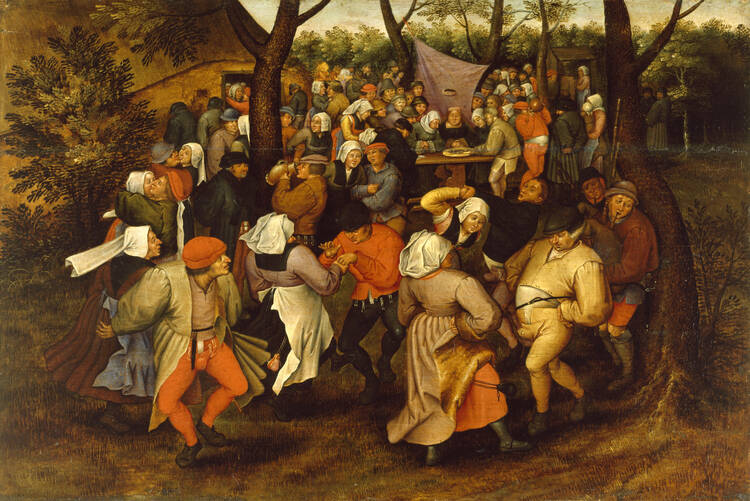We see life’s most important scenes more fully through the lenses of time and memory. Sometimes there’s a surfeit in the original spectacle, too many rich details to absorb. With the distance of years, they come into focus, and we recognize their import.
Jesus likens the kingdom of heaven to a wedding feast, which begs the question, without offering an immediate answer, how does a wedding feast resemble heaven? Recalling those of my youth, when the last of my uncles and aunts, or the first of my many cousins, were marrying, I wondered, what did I see of heaven in the central Kansas weddings of my youth?
To be sure, they were grand events. There were no D.J.’s back then. We had live music, provided by the big name bands like Eddie Basgall or The Hermanettes. They didn’t just perform in central and western Kansas. They’d played Topeka.
People could polka till they were pooped, and they did. These were men and women who worked hard, six days a week, who rarely, if ever, traveled during vacations. A wedding celebration entered their lives like rain on the prairie, always gratefully received when it blew in.
The dancing would begin with the wedding march. An older couple would lead the bride and groom in an elaborate route. Everyone else followed behind them. One had to be blind, crippled or diapered to be excluded. Grandmas grabbed grandkids; widows locked arms with other widows. We’d all march together; then the men and the women would break apart. The two lines would twine through each other, pass underneath each other, and, finally, in preparation for their first dance, form concentric circles around the bride and groom.
My favorite dance was The Flying Dutchman. Trios would march around in a circle, until the band broke from march into fandangle. Then the two outside partners would take turns, locking elbows with the middle companion, swinging him or her between them until the march resumed. Danced lively enough, the middle partner barely touched the ground.
Of course the bands could do more than play polkas. Did Ike and Tina Turner know that Proud Mary could be done in three quarter time, and with a German accent? There were also country songs, like Red River Valley and Elvis’ Love Me Tender, and it seemed as though every woman grabbed her fellow when the band would begin Tammy Wynettes’ Stand by Your Man. My father would arch his back and dance so elegantly. (My mother referred to this as his Gene Autry look.) Uncle Donny would pivot around Aunt Francie, his belly protruding over his large, silver belt buckle. Uncle Kendall would dance, cheek to cheek, with Aunt Betty. With Aunt Betty! Cheek to cheek!
What could this possibly have to do with heaven? More than you might suppose. Most people think of heaven as some sort of cloud-bestrewn spot that supersedes earth, but such an anemic paradise could never rival our world. We would do better to think of Christ’s kingdom as that which brings our earth to completion, allows it to flourish and to flower, like hard working men and women, dancing away their cares in the company of family and friends.
Perhaps to some extent, people do understand this, because we speak of our departed loved ones as pursuing their most favored earthly pastimes. But we’re apt to forget, or ignore, the second half of Christ’s simile, about the one who comes unprepared for the feast.
If one imagines heaven as some sort of dimension, which we simply slip into, one with little or no relationship to earth, it’s hard to understand how our current lives determine those that are yet to come. At best, we think we’re on earth to earn heaven, like a passing grade.
But our lives aren’t being graded; they aren’t even being judged, if, by that, you imagine some extrinsic adjudication. No, our lives themselves create, or confound, our capacity for heaven. Earth readies heaven, births it within us. Learn to dance, and you can have great fun at a wedding. But what about the one who never manages to mind the measure? Or the one who doesn’t even respond to the invitation?
In most moments of our lives, the times we can truly call human, we’re either opening ourselves to the mystery, which we call God, or shutting ourselves off from it. Each of those moments leaves an imprint, forms us into the person God intended. Every day of our lives, our heavenly self is being fashioned. Unless, of course, it’s not.
Heaven isn’t a boundary we cross. It’s Christ’s meter and measure, which we make our own, and then, suddenly, without knowing it—and of course by the grace of God—we’re dancing.
Isaiah 25: 6-10a Philippians 4: 12-14, 19-20 Matthew 22: 1-14








